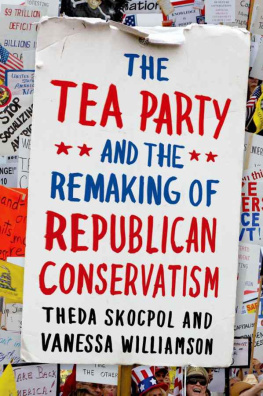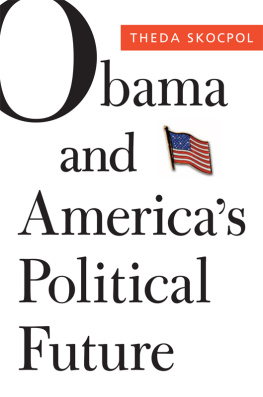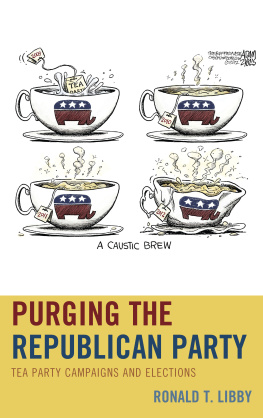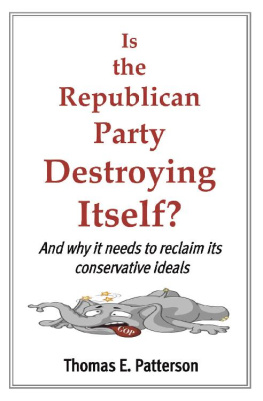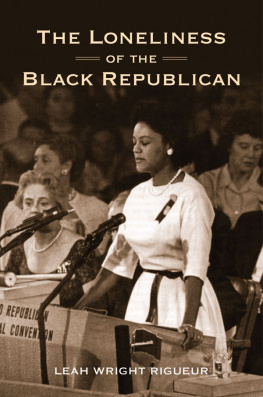The Tea Party and the Remaking of Republican Conservatism
The Tea Party and the Remaking of Republican Conservatism
THEDA SKOCPOL AND
VANESSA WILLIAMSON


Oxford University Press, Inc., publishes works that further
Oxford Universitys objective of excellence
in research, scholarship, and education.
Oxford New York
Auckland Cape Town Dar es Salaam Hong Kong Karachi
Kuala Lumpur Madrid Melbourne Mexico City Nairobi
New Delhi Shanghai Taipei Toronto
With offices in
Argentina Austria Brazil Chile Czech Republic France Greece
Guatemala Hungary Italy Japan Poland Portugal Singapore
South Korea Switzerland Thailand Turkey Ukraine Vietnam
Copyright 2012 Theda Skocpol and Vanessa Williamson
Published by Oxford University Press, Inc.
198 Madison Avenue, New York, NY 10016
www.oup.com
Oxford is a registered trademark of Oxford University Press
All rights reserved. No part of this publication may be reproduced, stored in a retrieval system, or transmitted, in any form or by any means, electronic, mechanical, photocopying, recording, or otherwise, without the prior permission of Oxford University Press.
Library of Congress Cataloging-in-Publication Data
Skocpol, Theda.
The Tea Party and the remaking of Republican conservatism / Theda Skocpol and Vanessa Williamson.
p. cm.
Includes bibliographical references and index.
ISBN 9780199832637 (hardback : alk. paper)
1. Tea Party movement. 2. ConservatismUnited States. I. Williamson, Vanessa. II. Title.
JK2391.T43S56 2012
320.520973dc23 2011038685
1 3 5 7 9 8 6 4 2
Printed in the United States of America on acid-free paper
Contents
List of Figures
.
.
.
.
Preface and Acknowledgments
Surprise and curiosity prompted us to do research on the Tea Party.
Most scholarship on U.S. politics addresses established academic questions, pulls concepts and hypotheses off the library shelf, and chews over computerized datasets. But when the Tea Party burst on the scene starting in 2009, it challenged assumptions about how U.S. politics would play out following the big Democratic victories in the 2008 elections. No canned datasets would be of much use to track an emergent set of protests; and the Tea Party as a whole could not be plopped into available conceptualizations about third parties, social movements, or popular protests during sharp economic downturns. Perfect! Many in academia turn away if something doesnt fit. But we were fascinated and intensely curious about this puzzling outburst. We wanted to get off our duffs, figure it outand tell others what we found.
In 2009 and early 2010, Theda was doing research on the Obama presidency and the politics of health reform when the surprise victory of Republican Scott Brown in the Massachusetts special election put a spotlight on Tea Party activists and funders. In fact, the Tea Partiers were out there on the Massachusetts roadways, dressed in costumes and waving their signs. Clearly, the Tea Party was becoming a force in electoral politics, countering if not upending the policy agendas of the Obama administration. But who was involved in the Tea Party? How did it work, this combination of grassroots activism with sudden infusions of hundreds of thousands of dollars into campaigns such as Scott Browns for the U.S. Senate? Would the Tea Party impact on electoral politics and public policy-making prove minimal and ephemeralor was something bigger afoot? The answers were not obvious at allso the questions kept nagging.
Around the same time, Vanessa was interested in grassroots activism about health reform, and decided to launch a research project for one of her graduate seminars comparing citizen mobilization around health reform on the left and right. She intended to look at both the Tea Party and Organizing for America (OFA), the organization founded to follow up on activism in the Obama presidential campaign of 2008. But very quickly she discovered that OFA was essentially dormant at the grass roots, with phone banking and email alerts proceeding in ways typical for routine party politics. Tea Party activists, by contrast, were holding meetings and plotting dramatic protests to oppose health reform legislation pending in Washington DC. Vanessa had originally presumed the Tea Party to be little more than a media phenomenon, pushed by conservative big-money funders. Her assumptions upended, she decided to look more closely at the Tea Party activists. Working with a fellow graduate student, John Coggin, she contacted Massachusetts Tea Partiers and arranged observations and interviews during the spring of 2010.
In the summer of 2010, Vanessa and John teamed up with Theda to write an article, The Tea Party and the Remaking of Republican Conservatism, that was accepted by Perspectives on Politics to appear in March 2011. Research for that article raised additional questions and suggested further lines of investigation. With encouragement from David McBride at Oxford University Press, Theda and Vanessa hatched the plan for this book.
We set out to learn more about the Tea Partys impact on the Republican Party, its role in the 2010 elections, and its impact on national political debates. We recruited two undergraduates to help us assemble a nationwide database on local Tea Parties, and we reached out to Tea Party activists in states beyond Massachusetts to arrange to observe meetings and talk with people at the grassroots in other states. A huge amount of new research needed to get done in a few short months so that this book could appear by the end of 2011.
Many people have helped us develop arguments, complete the research, and produce the book. Of course, people at Oxford University Press have been central, and we thank David McBride, Alexandra Dauler, Amy Whitmer, and others at the Press for their wise advice and efficient professional efforts.
on ideological polarization in the House of Representatives. His willingness to help us document a key political transition is much appreciated. We also thank Harvard graduate student Rich Nielsen for introducing us to the Jon McNaughton painting, One Nation Under God. For their work on the nationwide database of local Tea Parties, we are deeply grateful to Andrew Crutchfield and Will Eger, two Harvard undergraduates who did hundreds of hours of skillful sleuthing on the Internet during the spring semester of 2011. They not only coded data; they also alerted us to fascinating features of specific groups around the country.
Although this book was developed in a compressed time, we nevertheless took opportunities to make presentations to fellow scholars along the way, and picked the brains of colleagues willing to read papers and drafts. We are grateful for comments and insights offered by Dan Carpenter, Gregorz Ekiert, Claudine Gay, Peter Hall, Jennifer Hochschild, and Robert Putnamall colleagues in the Harvard Department of Government. We also benefited greatly from lively discussions of our research at the seminar for the March 23, 2011 Alexis de Tocqueville Lecture sponsored by the Center for American Political Studies at Harvard, and at the April 28, 2011 meeting of the Boston Area Research Workshop on History, Institutions, and Politics, where Mark Helbling and Alex Hertel-Fernandez provided very helpful comments. At the Tocqueville event, the official discussants Suzanne Mettler of Cornell, Larry Bartels of Princeton, and Mickey Edwards of the Aspen Institute each offered sharp observations; and Jane Mans-bridge of the Harvard Kennedy School asked a thought-provoking question about democratic participation. And in both group discussions, colleagues posed telling questions about data and interpretations. We have not answered all of their points, but their arguments made an impression and allowed us to improve our manuscript up until the last minute.
Next page
